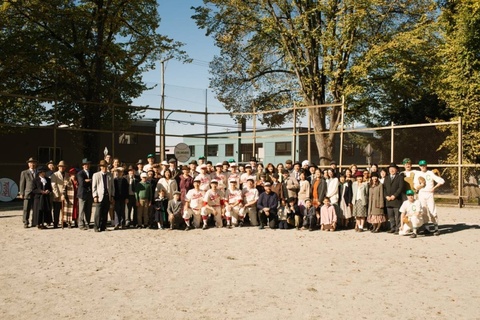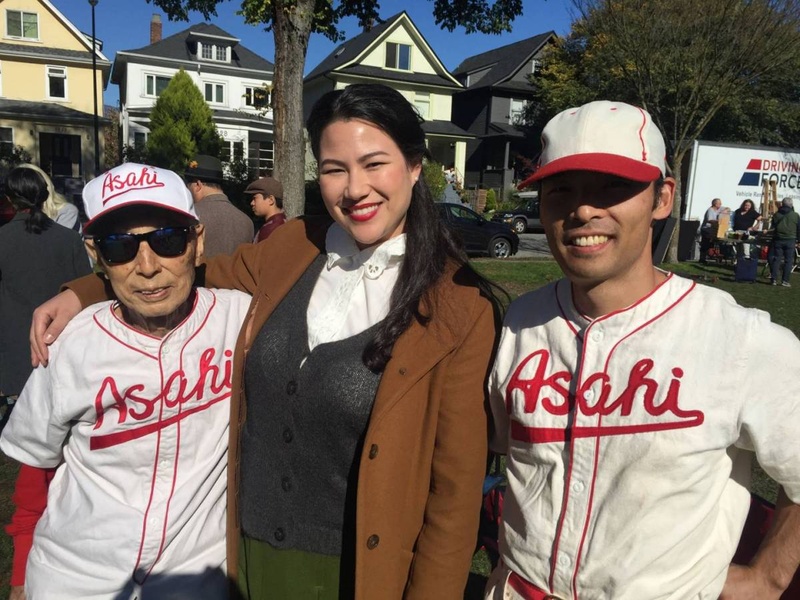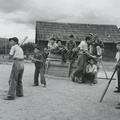On a sunny October day, I made my way to Woodland Park to watch history being made. The legendary Vancouver Asahi had once again taken the field, or at least a very close replica. The story of the baseball team was being turned into a Heritage Minute, produced by Historica Canada, the first to narrate a significant moment in Japanese Canadian history.
Japanese Canadians have called Canada home as early as 1877 and by the 20th century they too had found a love for baseball. The Asahi Baseball Team formed in 1914 in the heart of paueru-gai (Powell Town), now known as the historic Powell Street neighborhood in Vancouver’s Downtown Eastside. Oppenheimer Park was known as Powell Grounds and home base to the Asahi.
On set, adorned in 1940s-style clothing, enthusiastic extras (myself included) consisted of descendants of the Asahi players, members of the contemporary Shin Asahi Baseball Team, and local Vancouverites. As the eager crowd lined the field ready to cheer on their favourite team, the Asahi players in stunning replica uniforms warmed up with the opposing team. With the crack of the bat, the crowd cheered, and my imagination ran wild. Feelings of pride rushed over me and I thought of my great grandmother, Hisaye.
In 1921, at the young age of 19, Hisaye immigrated on her own to Canada. She was sponsored by her cousins, the Fukui family, who lived in paueru-gai. She joined the family business as a domestic worker and helped raise the Fukui boys who grew up to become incredible Asahi players. As I watched the actors play, I could imagine her sense of pride and love for the team.
The budding amateur team was challenged by racial barriers and discrimination that prevented them from joining Vancouver’s baseball leagues. And so in 1919 the Asahi joined the newly formed International League and won their first of many championships. They played with respect, determination, and strove for fair play, even when the umpire’s calls were not in their favour.
After a few takes, I looked behind the camera and saw Kaye Kaminishi, settling in to watch with his family by his side. At 97 years young, Kaye humbly bears the weight of being the last surviving Asahi player. He joined the Asahi in 1939 as a proud benchwarmer but his career was cut short because of the internment—the Asahi played until 1941, not knowing that it would be their last season.
Following the December attack on Pearl Harbor, Canada declared war against Japan. For the Asahis and 22,000 other Japanese Canadian men, women, and children living along the west coast of Canada, this meant being registered as enemy aliens (despite being Canadian), forcibly removed from their homes and sent to internment/incarceration camps, road/labour camps, and to the harsh sugar beet fields of the prairies.

Shot partly on location at the former site of the Tashme Internment camp, just outside of Hope, B.C., the Asahi Heritage Minute offers a reenacted glimpse into the life of those interned. Ryan Ellan, curator at the Sunshine Valley Tashme Museum, worked with the production to ensure accuracy, and provided real items from Tashme—including bats and benches—to be used in the Minute.
Like other Asahi players, Kaye went on to overcome racial barriers and boost morale in the internment camps by setting up a softball team for the young men in East Lillooet. Kaye continues to fight against racism, promote fair sportsmanship, and educate all Canadians about unjust government policies. His appearance during filming was met by surprise and awe, as fans lined up to shake his hand, take a picture, and get an autograph.
Through the early efforts of author Pat Adachi and her publication Asahi: A Legend in Baseball (1992), the story of the Asahi heroes who levelled the playing field is internationally known. Her work led to the team’s induction into the Canadian Baseball Hall of Fame and the B.C. Sports Hall of Fame.
To tell this story of national significance, Historica Canada worked with Vancouver’s Point Blank Creative. Members of the Japanese Canadian community were brought on board to consult throughout the production and included Grace Eiko Thomson, former president of the National Association of Japanese Canadians (NAJC) and past executive director/curator of the Japanese Canadian National Museum (now Nikkei National Museum); Linda Reid, research archivist NNM; and myself, representing the NAJC.
I acknowledge with gratitude the entire team that helped encapsulate the Asahi Baseball Team’s legacy and educate individuals on one of Canada’s greatest injustices. In 60-seconds it is a short but powerful reminder of what is lost when discrimination, prejudice, and fear are given power; and a testament to the strength of our community, who endured the unendurable, to speak our story in the hope that such injustice is never repeated.
The Heritage Minute about the Vancouver Asahi is the first one to be released not only in English and French versions but also a Japanese-language version.
English-language version
French-language version
*This article was originally published by The Georgia Straight on February 20, 2019.
© 2019 Lisa Uyeda




